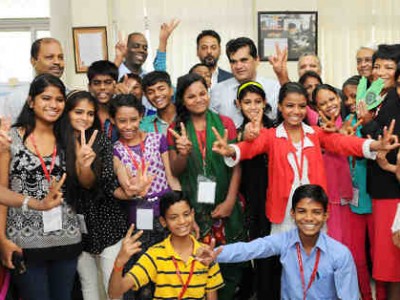
Protect Children’s Right to Education in Kashmir: Amnesty

Protect Children’s Right to Education in Kashmir: Amnesty
The Jammu and Kashmir (J&K) state government should bring to justice those responsible for the burning of schools in Kashmir and end the occupation of schools by security forces, Amnesty International India said today.
Since July, Amnesty says, at least 25 schools have been completely or partially burnt across 10 districts of Kashmir and three schools were set on fire on 29 and 30 October.
“Schools should be safe spaces under all circumstances. The vicious arson attacks on schools end up denying children in Kashmir their right to education. This disturbing trend must stop,” said Aakar Patel, executive director, Amnesty International India.
Kashmir has been facing a series of violent incidents since the killing of a 22-year-old rebel leader Burhan Wani by the Indian security forces on July 8 in an encounter which many believe was avoidable.
[ Stop Human Rights Abuses in Kashmir: Rights Groups ]
Nearly 100 people have died and thousands injured in the conflicts between the supporters of Burhan Wani and the Indian security forces in Kashmir.
Amnesty reports that security forces have used arbitrary and excessive force in response to the protests and hundreds of people have been blinded or otherwise injured, by pellet-firing shotguns. Hundreds of people, including children, have been placed in administrative detention.
On 13 September, the UN High Commissioner for Human Rights reiterated a request, first made in July to Indian and Pakistani authorities, for access to all parts of Kashmir to look into allegations of human rights violations. India’s Ministry of External Affairs has denied the request, according to Amnesty India.
Meanwhile, the Jammu and Kashmir (J&K) High Court has asked the state government to immediately take preventive measures. The Director of School Education in Kashmir told Amnesty International India, “It is difficult for us to protect all the school buildings as they are scattered all over the geographical areas of the valley. We are trying to involve local village and mosque committees in the protection of the schools.”
[ Support RMN Foundation Free Schools for Deserving Children ]
“The right to education of children in Kashmir can also be hampered by the use of schools for military purposes,” said Aakar Patel. “The presence of security forces in schools can increase the risk of them being attacked, and the long-term occupation of schools can increase dropouts and lower student enrolment and teacher recruitment.”
According to authorities, paramilitary forces have set up camps in at least seven schools in Kashmir since August. The government has shifted some of the venues of upcoming school examinations away from schools occupied by security forces.
[ Education Dilemma: Let Us Save the Lives of Our School Children ]
In 2010, India’s National Commission for the Protection of Child Rights set out guidelines for the “protection of children’s rights in areas of civil unrest.” The guidelines state that the use of schools by security forces “violates the spirit and letter of the [Right to Education Act] because it actively disrupts access to education and makes schools vulnerable to attacks”.
According to Amnesty, the Supreme Court has in the past ordered security forces to vacate schools in Chhattisgarh and states in north-east India.
[ How India Is Losing the Diplomatic Battle on Kashmir ]
India is obligated under international law to respect, protect and fulfil children’s right to education. In 2014, the Committee on the Rights of the Child, which monitors the implementation of the Convention on the Rights of the Child (CRC), to which India is a state party, expressed serious concern about the occupation of schools by security forces in India.
In 2015, the UN Security Council expressed “deep concern that the military use of schools in contravention of applicable international law may render schools legitimate targets of attack, thus endangering the safety of children,” and encouraged member states “to take concrete measures to deter such use of schools by armed forces and armed groups.”
Over 50 countries have endorsed the Safe Schools Declaration, which calls for improving protection of schools, students and teachers during armed conflict, and includes a commitment to carry out the ‘Guidelines for Protecting Schools and Universities from Military Use During Armed Conflict.’
Photo courtesy: Amnesty


